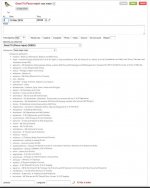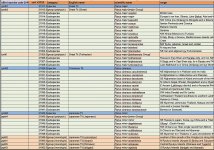Another missive (missile?) from the front line received yesterday (14/3):
"We are pleased to announce that the Internet Bird Collection and the Macaulay Library and eBird at the Cornell Lab of Ornithology are joining forces. For nearly two decades, the Internet Bird Collection (IBC) has engaged a global community of birdwatchers to share their videos, sounds, and photos of birds from around the world. The IBC is full of tremendous contributors and resources that will soon find a new home with the Macaulay Library at the Cornell Lab of Ornithology—a multimedia archive of birds, mammals, amphibians, reptiles, and insects. This new collaboration will leverage the long-term archival capabilities of the 90-year-old Macaulay Library (ML) and the powerful online tools for birders developed by eBird. The IBC has played an important role in providing media resources for the HBW Alive, and the Cornell Lab of Ornithology plans to carry that critical work forward into the new "Birds of the World" project currently under development at the Lab. Your contributions to the IBC have been critical, and we greatly value the opportunity to engage with you during this time of transition and ensure that your hard work and efforts around media can be put to their best potential use.
IBC contributors will enjoy many benefits on the new platform, such as a streamlined data entry experience at eBird, full integration with eBird’s listing and birding tools, and the permanent archival capabilities of the Macaulay Library. Users will be able to take advantage of eBird’s features and Macaulay Library tools, which includes features such as the ability to upload more than one file at a time from the same date and location.
How will it work? With your explicit permission, we plan to shift every user’s IBC data over to the Macaulay Library and eBird at the Cornell Lab of Ornithology. Historic media from the IBC will be treated as a distinct collection in the ML/eBird database, and each asset brought in through this process will have the IBC brand associated with it. When logged into their accounts, users will see their IBC contributions. Moving forward, eBird (the website eBird.org and associated mobile app) will be the data entry platform for uploading videos, sounds, and photos. Media uploaded after the merger via eBird will be treated as a part of the rapidly growing global resources of the Macaulay Library and eBird at the Cornell Lab of Ornithology.
Free Access: As always, all contributors and visitors will have free online access to uploaded materials and the Cornell Lab is committed to keeping similar IBC functionality.
Timing: We expect the transition to take 6–8 months. In the interim, the current IBC site will remain active and you will be able to access the site as usual. We anticipate a process in which users will not experience a gap in service. We will inform users of the transition progress, and carefully track any issues that may arise.
Communications: Several key steps will need to be taken to ensure your data and media are successfully transferred to the Macaulay Library: 1. Users need to provide explicit permission for Lynx to share their contact information with the Cornell Lab; 2. Users need to agree to a non-exclusive licensing agreement (see below) in order for their media to be transferred, archived, and accessible online; 3. Users who do not have a Cornell Lab/eBird account will need to create a Cornell Lab account so that we can associate your IBC data with your new account. Detailed, simple-to-follow directions for each of these steps will follow.
Copyright and licensing agreement: The Cornell Lab’s media licensing agreement states that the contributor retains the copyright to each piece of contributed media, and that the Lab cannot sell your media to a third party for commercial use without explicit permission from the contributor. The Cornell Lab can use your media for education, conservation, and research—to fulfill its mission.
Is the transition mandatory? The goal is to shift the entire IBC collection over to the Macaulay Library, and transition IBC contributors into the eBird/Macaulay Library suite of tools moving forward. At the end of this process, Lynx will retire the current version of the IBC. We hope to work closely and carefully to transition every IBC user over successfully. If you choose not to opt-in to this transition, your media uploaded to the current IBC will no longer be accessible online. It will not be transferred to the Macaulay Library or be available via the IBC. We hope you do not choose this path, and we look forward to working with you.
We hope you share in our excitement at this time of change. We are here to provide support and ensure a smooth transition. We are working hard so that the level of service and scholarship provided by the Cornell Lab resources will continue to meet and exceed your expectations. Stay tuned for more information regarding the transition. Please visit MacaulayLibrary.org for more information and updates throughout the transition process. At any time please feel free to contact Eliot Miller (
[email protected]) if you have any questions or concerns.
Good birding!"











